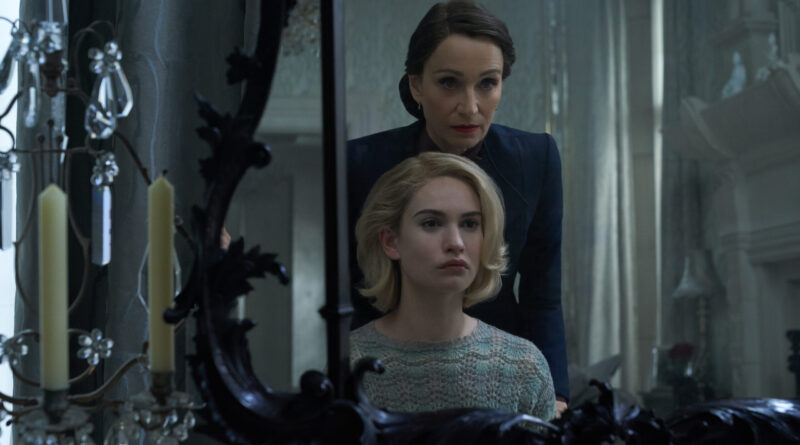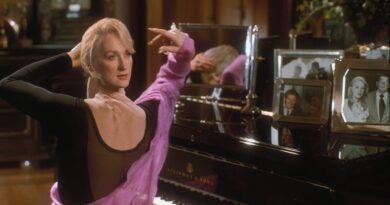Rebecca (2020)
Daphne Du Maurier’s novel Rebecca is a ghost story in which there isn’t an actual ghost; the memory of the title character, the legacy and influence she left after supposedly drowning at sea a year ago, is so pervasive that it really seems like a haunting, a possession. Alfred Hitchcock retained this in his 1940 film adaptation, which I think greatly contributed to its success, culminating in eleven Oscar nominations and two wins for Best Picture and Best Cinematography. Going into Ben Wheatley’s new adaptation – which can be seen in theaters, as well as on Netflix – I was admittedly worried that, to make it appealing for 2020 audiences, the metaphorical ghost would be made literal. Sporadic shots of a mysterious woman running through crowds and down hallways in dreamlike, almost hallucinatory visions didn’t do much to ease my mind, especially since the woman’s face is never shown and she’s made to stand out in a bright red dress.
Thankfully, it was clear to me by the end that Wheatley, in that particular respect, was staying faithful to Du Maurier’s story. Dreamlike visions notwithstanding, this film avoids supernatural occurrences, and we’re obviously meant to be strung along by the moody atmosphere and the character development. In most respects, Wheatley stayed faithful to Du Maurier’s story; it’s still about an unnamed young woman (Lily James) who, in 1930s Cornwall, England, marries Maxim de Winter, the wealthy heir of a sprawling English manor (Armie Hammer), only to be tormented by constant reminders of his previous wife Rebecca and belittled by Mrs. Danvers, the manor’s head housekeeper (Kristin Scott Thomas). It’s also still about the circumstances of Rebecca’s death, the details of which are forced into question by an unforeseen turn of events.
Most viewers and critics will make this about which director, Hitchcock or Wheatley, better translated Du Maurier’s material. You know me; I don’t like to look at movies that way. I’d much prefer to make this about what each director brought to the table, and where each director fell short. Hitchcock, for example, perfectly captured the second Mrs. de Winter’s shyness, which today would be called social phobia or social anxiety disorder. However, because of the Hollywood Production Code of the time, Hitchcock was also forced to alter a key detail about the title character’s death, which did nothing but make a different character far less complicated – or, if you like, far more of a one-note caricature.
Wheatley, free from the constraints of the now-defunct Production Code, wisely chose not to alter that key detail, allowing the other character mentioned above to remain more complicated, more ambiguous, more challenging for viewers to judge. The trade-off is a less-relatable depiction of the second Mrs. de Winter’s shyness; though it’s clear that she’s socially awkward, naïve, and even very afraid at times, she’s less of a true social phobic and more of a timid-to-courageous movie typecast. One of the highlights of Hitchcock’s film, and of Du Maurier’s novel, was its uncannily accurate depiction of social anxiety. For that depiction, Joan Fontaine, who I can’t resist calling the first second Mrs. de Winter, received an Oscar nomination for Best Actress.
The story’s most memorable character, there can be no doubt, is Mrs. Danvers, that loathsome villainess who never tries to conceal her hatred of the second Mrs. de Winter – or her love of Rebecca. Despite the Production Code, Hitchcock’s film, in which she’s played by Judith Anderson, strongly implies that her pathological obsession with Rebecca was really a lustful lesbian attraction. A taboo subject in 1940, to say the very least. Hitchcock also made her a formidable presence – intense and theatrical, her gaze chewing the scenery more than her words ever could. Wheatley’s film takes a different approach; her obsession with Rebecca is more consistent with a mother/daughter relationship, although a few homoerotic undercurrents remain. And as would be expected, Scott Thomas’ acting style is far more naturalistic. Unlike Anderson, she allows Mrs. Danvers to smirk with sadistic satisfaction in deeply personal moments of quiet victory.
I really don’t want to make this about which version of Rebecca is better. Yes, I do have a preference: Hitchcock’s film. But my preference doesn’t negate the artistic merits of Wheatley’s film. I know people who would hate Hitchcock’s version for being so heightened, so dramatic. They will respond much better to Wheatley’s version, which tells a dramatic story without having to be so dramatic, if you get my meaning. And the events of the final act are slightly altered so that the ending is more of an audience pleaser. This isn’t to suggest that the ending is artificially happy; it’s simply that it’s more confident, more definite, more … well, more final. Of course, I also know people who will hate Wheatley’s version, not just for changing certain aspects of the story, but simply for being a remake. I’ve made my feelings about remakes very well known by now. No need to repeat myself.




